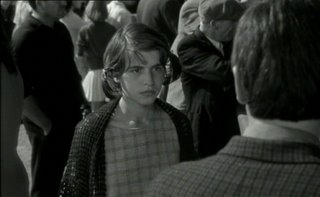 There are two kinds of people: those who like Napoleon Dynamite and those who don't. I'm the third kind. My opinion of the movie changed over the course of watching it for the first time. My first impression was: too dry, too deadpan, not all that funny. My final impression was: perfectly dry, just deadpan enough, and very funny. But something else stuck with me, a sense that the movie was not as trivial as it seems at first glance.
There are two kinds of people: those who like Napoleon Dynamite and those who don't. I'm the third kind. My opinion of the movie changed over the course of watching it for the first time. My first impression was: too dry, too deadpan, not all that funny. My final impression was: perfectly dry, just deadpan enough, and very funny. But something else stuck with me, a sense that the movie was not as trivial as it seems at first glance.The problem with the usual reactions is that the lovers love it for the same reason the haters hate it: it's just a chance to make fun of the yokels. If you enjoy doing that, the movie gives you some pretty prime targets. If you feel too guilty to enjoy doing that, the movie leaves you feeling grumpy and/or queezy. But the movie's much more interesting than that. It is, first and foremost, a parody of the 80's high school comedy: complete with a high school dance as the narrative's centerpiece, Alphaville on the soundtrack, and a "nerds win" moral. Like any good parody, it's a critical one. Napoleon reveals the essential identity of the Nerds Win genre with what it tries, and fails, to critique.

The 80's high school comedy tries to critique social ostracism: the social ritual of identifying, isolating, and persecuting an outgroup. But it does so by simply reversing the roles: the nerd, the rebel, the loner become the ingroup, and the jocks and cheerleaders become the whipping boys. It's a revenge fantasy, and like all revenge fantasies, it's motivated by envy. The losers don't object to the cruelty of the system, just to being at the bottom of the pile. (The one beautiful exception to this rule is Heathers.)
It is appropriate that this fantasy dominates the films of the 80's (even the popularity of the sci-fi action picture is an indirect version, affirming the victory of science over nature, of the nerd's intelligence over the athlete's brute force). For the 90's were, after all, the decade of the actualization of the Revenge of the Nerds in an economic and cultural revolution led by poster boy, Bill Gates. The coincidence of the new economy with the rise--and critique--of global capitalism underlines the point: the nerds and rebels are working for the system, not against it.
Yes, the rebels too. A key premise of the Nerds Win genre is the claim that the nerds and rebels are allies. So, it's no surprise that the 90's was the decade of the rise of the rebel as well as the nerd--the decade that alternative music and culture broke into the mainstream and became an economically successful industry. (Thurston Moore called the year of Nevermind's release the year that "punk broke"--an unintentionally ambiguous phrase. Perhaps the year we broke punk?) The coincidence of nerd and rebel, victim and victimizer, revenge and justice is wrapped up in the tidiest of packages at decade's end, in Columbine High. (One of those moments of Hollywood wish-fulfillment that, like 9-11, reminds us to be careful of what Hollywood wishes for, because Hollywood always gets what it wishes for.)
In Napoleon Dynamite, the main character is not Napoleon, but the city of Preston, Idaho. If the movie mocks the yokels, as some have charged, then everybody—including the filmmaker, cast and crew—is a yokel. The obligatory lead jock and head cheerleader are every bit as wincingly uncool as Napoleon. Unlike the movies it parodies, Napoleon does not begin by defining an ingroup and an outgroup; it begins by defining the entire universe of the film as the outgroup, and cutting that universe off radically (in time and culture) from any other world from the perspective of which the characters might be able to evaluate themselves.
If, as self-righteous critics have charged, the film shows contempt for its characters, scorn for the yokels, where does it come from? There is no narrative foothold for that scorn—no positively presented voice of the author. The movie’s deadpan, understated delivery only further protects it from the charge of contempt. No hint of unseriousness, mockery, or sarcasm enters into the delivery of the lines—which often reaches positively Bressonian degrees of understatedness. If you can imagine Bresson directing a John Hughes movie, this is is that movie.
 Napoleon feeds his grandmother's lama.
Napoleon feeds his grandmother's lama.The critics are right to sense contempt for the characters. It's inevitably there, but it doesn't come from the film. It comes from the only ingroup left, the audience. We project upon the filmmaker—upon the voice of the film—the contempt and shame that we feel for the yokels. The disdain we inevitably detect is our own.
 Director Jared Hess, shown here in traditional Mormon costume, often addresses religious themes in his films.
Director Jared Hess, shown here in traditional Mormon costume, often addresses religious themes in his films.This is perhaps the most strikingly perfect aspect of its critique of the Nerds Win genre: by identifying every character as the out-group and refusing to side for or against them, it forces the audience to act out the role of jock or nerd. Those who love the movie identify themselves as the ingroup, and delight in the characters of the film as ideal objects for their scorn. Those who hate the movie identify with the characters as an outgroup, and resent the self-hatred and resentment that they inevitably project onto the film.
 "Would you like to look like this? Because for a limited time only, Glamour Shots by Deb are 20% off."
"Would you like to look like this? Because for a limited time only, Glamour Shots by Deb are 20% off."This aspect of incriminating the audience is probably best illustrated in the ambivalent status of the film as “hip.” The film’s financial success was ensured when it was adopted by the fashionably ironic hipster-set: the ones who wear, in mockery, the same perfectly out-of-date fashions and lingo that Napoleon and friends wear in earnest.
 "Napoleon, give me some of your tots."
"Napoleon, give me some of your tots."The characters’ out-of-dateness (bordering on outside-of-timeness) reflects their status as existing in a universe completely outside of the division of in-groups and out-groups: the near-complete cultural isolation of their little town from a world that could provide the contrast upon which designations of hip and unhip depend. The film’s stylishness serves the function of debunking the social, economic, and cultural hierarchy upon which style depends. It is, consequently, a radically subversive little movie.
 Hess credits his sensitive portrayals of the lives of simple rural folk to his privileged background and elite education: "Poor people are generally too dimwitted and backward to be able to portray themselves appropriately. I mean, they're just too fucking retarded to recognize that their senseless, economically unnecessary suffering and humiliation is an absolutely georgeous metaphor for the fall of humanity into sin, the innocence of faith, and the sublimity of divine grace. Fucking rednecks."
Hess credits his sensitive portrayals of the lives of simple rural folk to his privileged background and elite education: "Poor people are generally too dimwitted and backward to be able to portray themselves appropriately. I mean, they're just too fucking retarded to recognize that their senseless, economically unnecessary suffering and humiliation is an absolutely georgeous metaphor for the fall of humanity into sin, the innocence of faith, and the sublimity of divine grace. Fucking rednecks."
No comments:
Post a Comment